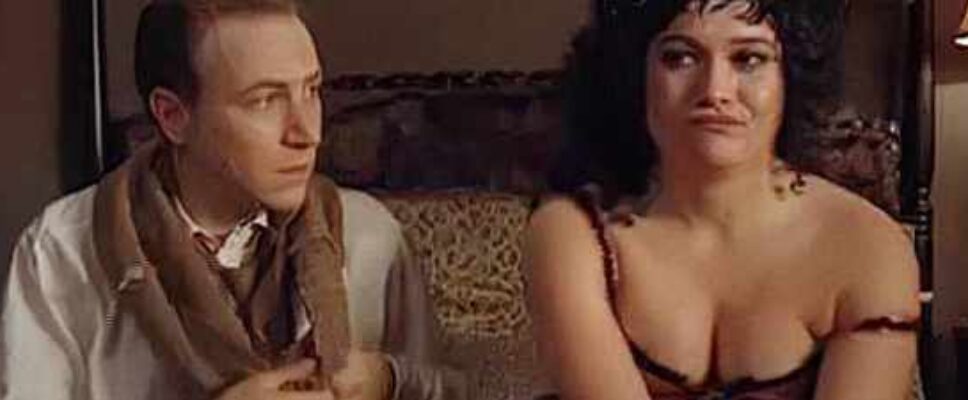Teresa Reviews Un Cadaver sur l’oreiller (2011)
Teresa reviews Un Cadaver sur l’oreiller (2011), the French version of “The Body in the Library,” and finds a sexed-up version of the Miss Marple novel.
Translated title is The Body on the Pillow
(c)2023 by Teresa Peschel
Fidelity to text: 2½ stranglers
![]() The underlying plot mechanism remains but the tone and stakes are wildly different.
The underlying plot mechanism remains but the tone and stakes are wildly different.
Quality of film: 4 stranglers
![]() Everything worked but the film’s a reminder that different cultures and times think differently. Real differently.
Everything worked but the film’s a reminder that different cultures and times think differently. Real differently.
Read more of Teresa’s Agatha Christie movie reviews at Peschel Press.
Also, follow Teresa’s discussion of these movie on her podcast.
Astonishingly, other than Miss Marple, a few red herrings, and the prostitutes in the brothel, every important character in the film has a counterpart in Agatha’s novel. Dolly Bantry? That would be Lampion, filling the dual role of her and Miss Marple, saving Col. Bantry, i.e., his boss, Larosière, from disgrace and the guillotine. The body isn’t found in Larosière’s library. The stakes were raised: He wakes up from a drunken stupor next to her in his own bed.

 Colonel Bantry was properly astonished and horrified when a maid opening the draperies in his library discovered a young woman’s body on his tiger skin rug. He’d never seen that tawdry girl before. Being a proper English gentleman, he knew — no matter what cruel gossip people spread — that he had nothing to do with her death. How could he? He was a respectable man, engaged in respectable pursuits to the point of being dull.
Colonel Bantry was properly astonished and horrified when a maid opening the draperies in his library discovered a young woman’s body on his tiger skin rug. He’d never seen that tawdry girl before. Being a proper English gentleman, he knew — no matter what cruel gossip people spread — that he had nothing to do with her death. How could he? He was a respectable man, engaged in respectable pursuits to the point of being dull.
Larosière does not have that assurance.
Wait. Back up. Prostitutes in the brothel? Why yes! They are why Larosière doesn’t have a clean conscience like Colonel Bantry does. He recognizes that pretty, under-dressed, dead tart in his bed. He’s seen that whore in the Blue Bird brothel which he patronizes. That same brothel where a few years before he pulled strings to make sure the madam, Josie Turner (aka Pandora), could stay in business catering to the sexual needs of highly placed men in Lille.

This morning, however, Larosière is in agony and not just from the hangover. There is a possibility that he might — might! — have strangled that girl and his horrified mind wiped all the memories away. Him, an important superintendent in the Lille branch of the Sûreté, might be a common thug. They’ll throw the book at him, and he’ll be guillotined for sure.
And it could happen. Superintendent Deville shows up, all smiles, soon after the case is reported to higher-ups. Deville loathes Larosière. The chance of not just getting rid of his hated enemy but permanently staining his reputation is irresistible. Deville seizes his moment in the sun, takes to the golf course to “think about the case,” stymies the investigation into learning what actually happened, and even refuses to allow an autopsy of the victim. The evidence is clear: the girl was strangled, she’s in Larosière’s bed, he’s been known to have quite a few too many, and he frequented the brothel where she worked. And, there’s a potential witness, Basil Blake (aka Charles Froment), who lives down the hall from Larosière’s flat.

Except on the same night that Ruby was strangled, she didn’t. Could the cases be related? Superintendent Deville doesn’t think so. Then, another of Ruby’s clients (told you it was different!), turns up. George Bartlett (aka Hector Maurel) also chased after Ruby at the Blue Bird brothel and was one of the last people to see her alive. Like his novel counterpart, this George is feckless, well-connected, and concerned about his stolen car. It’s located in the countryside, burned to a crisp. The body inside is unidentifiable, except for the teeth and a few unburnt scraps.
Larosière, with Lampion’s assistance, escapes police custody and hides out in the Blue Bird brothel. Lampion gets to know all the girls working there. They like his undemanding company (girls aren’t his cup of tea), but he doesn’t learn anything from them via pillow talk. Instead, he hits it off with Raymond, the brothel’s piano player, and they begin their affair.


Mark has always had a clear alibi for Ruby’s murder but if that’s not Ruby, then his alibi is gone. His alibi for his father’s death remains but what if he didn’t work alone? Who identified Ruby at the morgue in the first place?
Why, Josie, her madam at the Blue Bird brothel. Josie lied, because Mark promised her marriage and a comfortable life of status. She murdered his father while he was at the club. He planned the crimes and she helped execute them. With Ruby dead, Conway couldn’t adopt her. When Conway decided to change his will, they couldn’t wait for the old geezer to die on his own. Pamela was collateral damage, necessary so Josie and Mark could get what they wanted.
 Such a romantic.[/caption]The scenes with Josie and Larosière become sad in retrospect. He helped her when she needed it and she betrayed him too.
Such a romantic.[/caption]The scenes with Josie and Larosière become sad in retrospect. He helped her when she needed it and she betrayed him too.
This isn’t The Body in the Library you remember. But the tragedy of two young women murdered long before their time because of greed remains.

